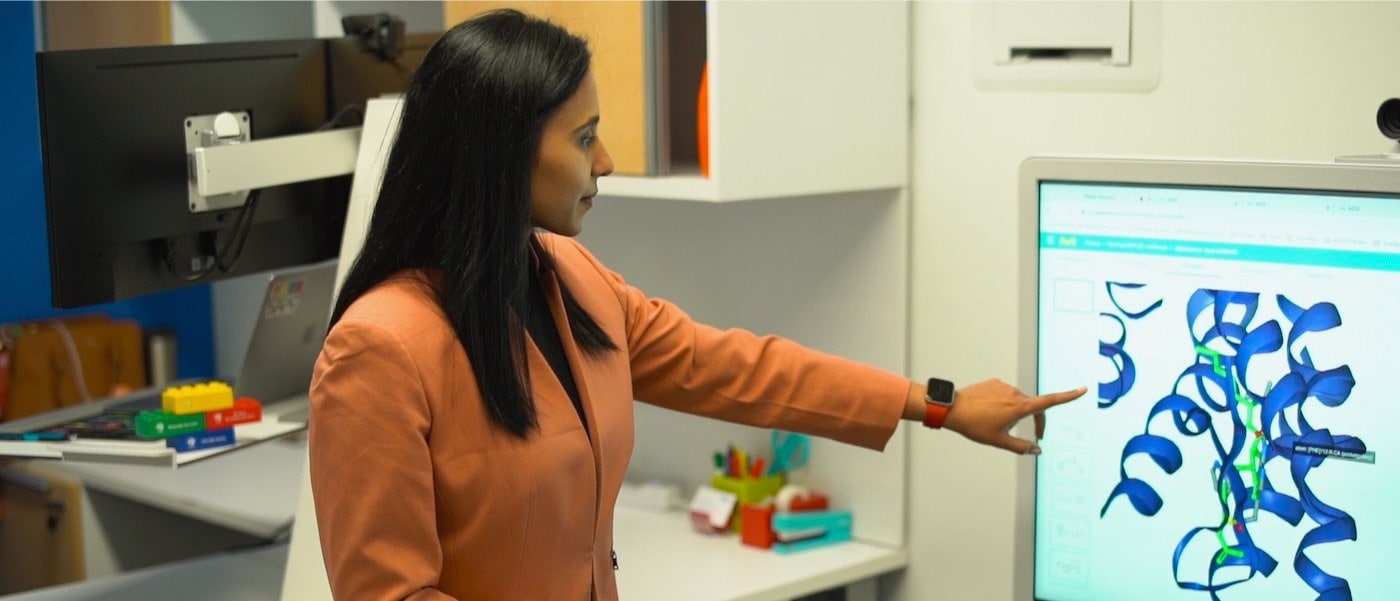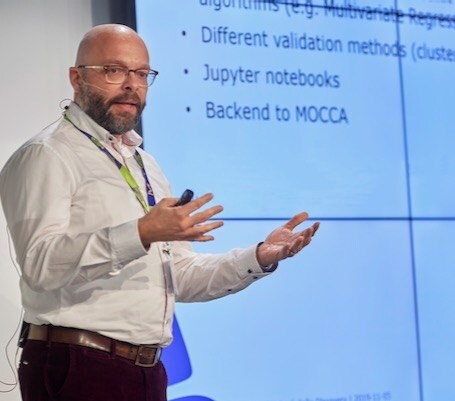Fast-Tracking Drug Discovery with an AI Boost
Before the new AI-powered drug discovery platform hit the market, it took trials, tribulations and a napkin.

March 13, 2024 | 4 min
“You should have kept that napkin.”
While this does not sound like typical advice one might hear from their manager, Karen Madden, Chief Technology Officer for the Life Science business of Merck, gave that tip. That’s because the scribbles on that napkin were the earliest renderings of a new AI-powered drug discovery platform.
Finding a promising molecule for a new therapeutic can feel like looking for a needle in a haystack. The options feel limitless and it’s a painstaking task to identify suitable candidates. What if instead of sifting through the haystack manually, you could use a powerful magnet or metal detector to find that “needle,” or a molecule with drug-like potential? AIDDISON is that magnet and metal detector rolled into one.
AIDDISON is a powerful software platform meant to shrink this painstaking step in the drug development process. Long before a new drug hits the market, begins clinical trials or enters preclinical research, it’s just an idea. A team identifies a specific target they want their future drug to reach, for instance, a faulty protein that’s causing issues for the patient. Researchers then need to find a molecule — or handful of molecules — that will inhibit a specific target, like that faulty protein.
It often takes more than a decade and over two billion US dollars to take a new drug from bench to bedside. More than 90% of drugs fail in clinical trials. The lost time, money and effort in failed new drug ventures can be staggering.
If, in the early stages of drug development — known as the drug discovery stage — scientists can more accurately identify molecules that are likely to succeed in later stages, it’s possible the 90% failure rate could drop. This means less money and time will be wasted on drug candidates that are doomed to fail in clinical trials.
"The key to successful drug design is to take a holistic approach, increase the success of each design cycle and make 'each shot count' to bring cures to the patient faster,” says Ashwini Ghogare, who regrets not saving the napkin, and is a key player in bringing the platform to customers.
"The key to successful drug design is to take a holistic approach, increase the success of each design cycle and make 'each shot count' to bring cures to the patient faster."
- Ashwini Ghogare
Combining Forces
The concept of AIDDISON began when Ghogare met Daniel Kuhn at a Merck conference in Burlington, Massachusetts, US, in 2019. After hearing Kuhn present about ways his team built machine-learning models to support their drug discovery work, Ghogare approached his dinner table later and said, “We have to talk.”
They talked about the challenges in drug discovery and visions of what solutions might look like. Leveraging existing data and artificial intelligence —a transformational technology — rose to the top of their conversations. And yes, they grabbed a napkin to jot down their ideas. In those early scribbles, they sketched out an early design of the interface and brainstormed some processes.

Daniel Kuhn presents at a Merck conference. Ashwini Ghogare was in the audience.
Ghogare was filled with excitement and anticipation in the weeks that followed. She could feel the energy and knew that they were onto something special.
Part of what made their collaboration work was that they came to the table with different academic and professional backgrounds. Ghogare completed a Ph.D. in organic chemistry that focused on engineering new therapeutic solutions for oncology application, which resulted in a start-up. She joined Merck in 2018 to drive product innovation for SYNTHIA, a software that empowers bench chemists to identify the most viable synthetic pathway for their drug candidates. Ghogare is passionate about bringing cutting-edge technology to scientists to accelerate the discovery of better therapies for patients.
Kuhn, on the other hand, completed a Ph.D. in computational chemistry in a drug design group. He’s focused on improving drug discovery ever since, including in his role with the Healthcare business of Merck. He’s committed to contributing towards finding new therapeutics and medicines for patients using predictive and generative modeling technologies.
Their deep experience in drug discovery, paired with expertise in software and platform development, proved to be a perfect combination. Outside of their distinct, but complementary backgrounds, another key part helped drive the collaboration forward. They simply had fun working together.
Built From Scratch
Years before the pair met in Burlington, Kuhn was building tools to help his team in the Healthcare business of Merck, to find better drug candidates faster.
To build up models, Kuhn needed to use a large data set. One that had details about how different molecules did or did not meet expectations in early experiments. Fortunately, his colleagues across the Healthcare business of Merck, meticulously kept data over decades. This rich experimental data proved to be key in advancing the models and ultimately, is a huge leg up for AIDDISON.
When Kuhn shared his innovation at the Summit in Burlington, Ghogare immediately saw the strength of the models and knew that it would have value amongst drug developers outside of the company. And so, the entrepreneurial effort to bring an internal tool to customers worldwide began.
Kuhn and Ghogare surprised themselves a bit with the rapid progress. With strong partnerships and teams in place, from the first conversation to the platform’s public launch, it took just over two years.
For Kuhn, a big part of the appeal of commercializing the tool was to make the drug discovery space more accessible for smaller teams, which rarely have access to large in-house datasets to build their own models. The more minds that are working towards novel therapeutic solutions, the better off patients will be.
“Models aren’t always right, but neither are humans,” says Kuhn. “Well-designed models, such as those in AIDDISON, are the basis for accelerating drug discovery by finding and prioritizing molecules with good properties and helping scientists make better decisions.”
AIDDISON is helping teams of all sizes identify top molecule candidates faster and shrink one pain point in the drug discovery journey.
About AIDDISON
Leveraging more than 20 years of pharmaceutical research data, the AI-powered AIDDISON™ platform combines generative design, predictive insights, and 3D modeling in a turnkey solution for accelerated drug discovery.
Generate ideas with rapid in silico screening of vast chemical databases and de novo design.
Optimize results for synthesizability and ADMET properties with real-world ML models.
Evaluate and prioritize hits with advanced data visualization and molecular binding tools.
To continue reading please sign in or create an account.
Don't Have An Account?